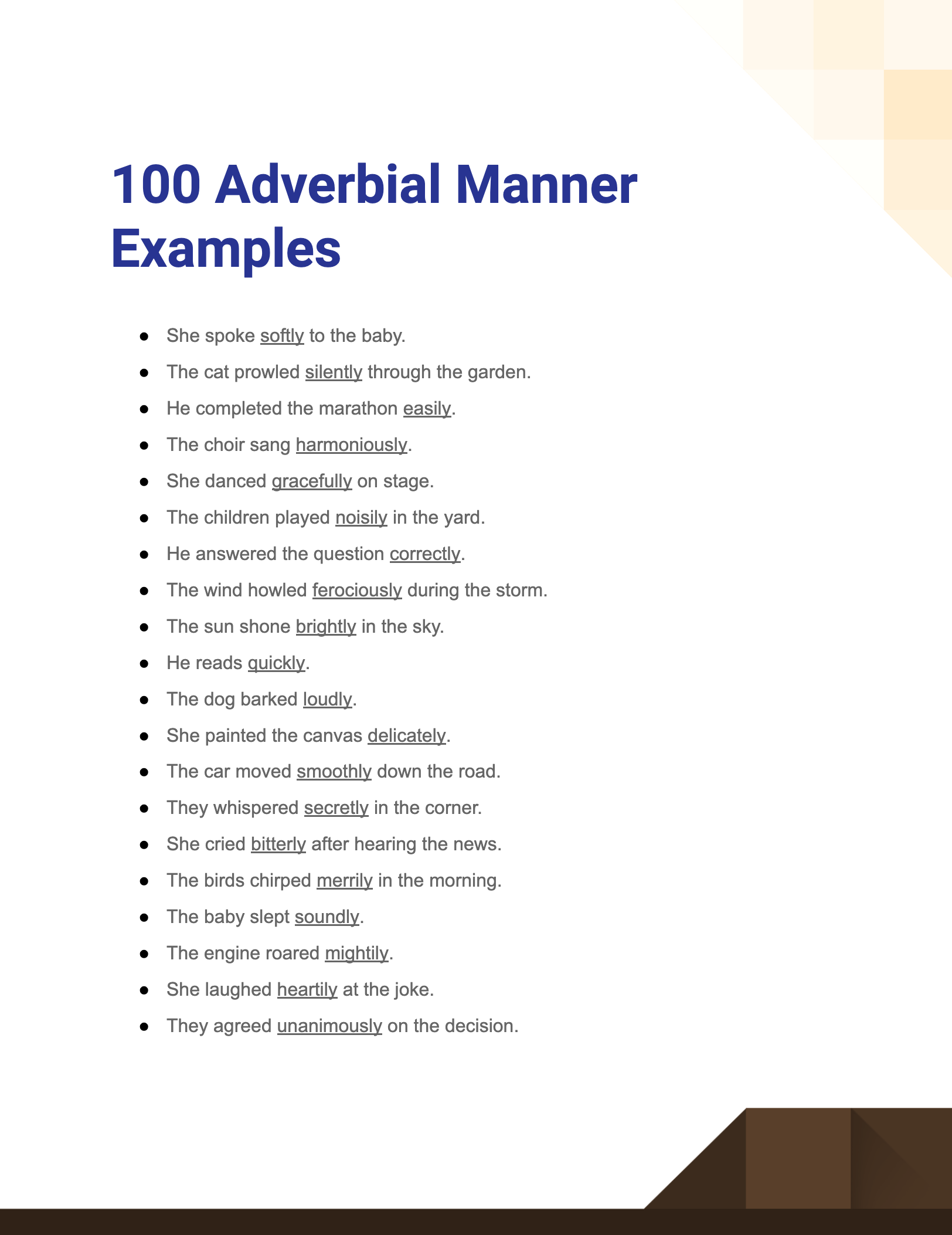99+ Adverbial Manner Examples
Delving into the nuances of the English language, the use of adverbial manner often stumps many. Yet, it’s integral to adding depth and clarity to our expressions. Whether you’re a grammar enthusiast or just looking to polish your communication skills, our guide on adverb examples, their correct usage, and expert tips will ensure you wield this linguistic tool with finesse. Embark on this enlightening journey and make your sentences shine!
What is an Adverbial Manner? – Definition
An adverbial manner, often simply referred to as a manner adverb, describes how an action is performed. It provides details about the nature of the action, usually answering questions like “how?”, “in what manner?”, or “to what extent?” These adverbs typically modify verbs, giving the reader or listener a clearer picture of how the action in the verb is being executed.
What is an example of Adverbial Manner?
Consider the sentence: “She sang beautifully.” In this example, “beautifully” is the adverbial manner because it describes how she sang. The verb is “sang” and “beautifully” provides details about the manner in which the singing occurred.
100 Adverbial Manner Examples

Delve into the vibrant world of adverbial manners with these illustrative examples. Each sentence sheds light on how these adverbs enrich language, adding depth and nuance to our expressions. Discover the varied ways actions can be described!
- She spoke softly to the baby.
- The cat prowled silently through the garden.
- He completed the marathon easily.
- The choir sang harmoniously.
- She danced gracefully on stage.
- The children played noisily in the yard.
- He answered the question correctly.
- The wind howled ferociously during the storm.
- The sun shone brightly in the sky.
- He reads quickly.
- The dog barked loudly.
- She painted the canvas delicately.
- The car moved smoothly down the road.
- They whispered secretly in the corner.
- She cried bitterly after hearing the news.
- The birds chirped merrily in the morning.
- The baby slept soundly.
- The engine roared mightily.
- She laughed heartily at the joke.
- They agreed unanimously on the decision.
- He sang passionately in the competition.
- The lion roared fiercely.
- She looked at him quizzically.
- The water flowed gently in the stream.
- The tree swayed gently in the wind.
- The horse galloped wildly.
- He drives recklessly.
- The kids behaved badly.
- He studied diligently for his exams.
- The movie ended abruptly.
- She entered the room quietly.
- The clock ticks steadily.
- The audience clapped enthusiastically.
- The mother scolded her son sternly.
- He gripped the bat firmly.
- The athlete trained rigorously.
- She stared at the painting intently.
- The phone rang persistently.
- The snow fell gently outside.
- He nodded slowly in agreement.
- The crowd cheered wildly.
- The volcano erupted violently.
- She explained the concept clearly.
- The guitar was strummed softly.
- The kettle whistled shrilly.
- He typed furiously on his keyboard.
- The students listened attentively.
- She responded sarcastically.
- The clouds moved lazily across the sky.
- He answered casually.
- The lightning struck viciously.
- The ballerina twirled effortlessly.
- The fish swam gracefully in the aquarium.
- The chef chopped the vegetables precisely.
- The deer leaped elegantly across the meadow.
- The musician played the violin beautifully.
- He arrived punctually at the meeting.
- The cat meowed demandingly.
- She writes eloquently.
- He sighed deeply in relief.
- The phone vibrated silently.
- The rain poured heavily.
- The tiger hunted stealthily.
- The computer processed the data rapidly.
- The children screamed excitedly on the roller coaster.
- The leaves rustled gently.
- The bear growled threateningly.
- The car stopped abruptly.
- The flowers bloomed vibrantly.
- The horse neighed loudly.
- He listened intently to the music.
- The windmill rotated slowly.
- She poured the tea carefully.
- The ship sailed smoothly across the ocean.
- The stars twinkled brightly.
- He yawned widely.
- The owl hooted mysteriously in the night.
- The chef stirred the soup gently.
- He looked curiously at the object.
- The phone buzzed continuously.
- The dragon breathed fire fiercely.
- The mouse scurried quickly across the floor.
- The writer pens his novels imaginatively.
- The cobra hissed menacingly.
- The water bubbled boisterously in the pot.
- The bird soared majestically in the sky.
- The waves crashed relentlessly against the shore.
- The runner sprinted energetically.
- The dog wagged its tail happily.
- The magician performed his tricks skillfully.
- The light shone dimly in the room.
- The frog croaked loudly in the pond.
- The student answered confidently.
- The fan spun quietly in the corner.
- The teacher explained the lesson patiently.
- The child munched on his snack noisily.
- The plane landed safely.
- He blinked surprisingly at the news.
- The snake slithered smoothly on the ground.
- She hummed melodiously while doing her chores.
Adverbial Manner Examples in Sentences
Enhance your grasp of adverbial manners with these enriching adverb in sentence examples. See firsthand how these unique adverbs can amplify your statements, giving depth to every action and painting a vivid image in the reader’s mind.
- The children laughed boisterously at the clown’s antics.
- The river flowed serenely through the woods.
- The old man hobbled painfully down the path.
- The cat purred contentedly on the windowsill.
- She argued persistently to make her point.
- The ball bounced erratically on the uneven surface.
- The leaves fluttered whimsically from the trees.
- The news anchor spoke articulately during the broadcast.
- The coffee brewed aromatically in the kitchen.
- The drummer played the beat rhythmically.
Adverbial Manner Exercise Examples
Looking to hone your understanding of adverbial manners? Dive into these exercise examples. Crafted to challenge and stimulate, they’ll help sharpen your application of these descriptive adverbs.
- The bird ____ (sing) in the morning.
- The toddler ____ (eat) his food with enthusiasm.
- She ____ (talk) during the entire movie.
- The rain ____ (fall) during the night.
- He ____ (work) on his project for hours.
- The candle ____ (burn) in the dark room.
- The student ____ (write) her notes during the lecture.
- The car ____ (drive) on the snowy road.
- The detective ____ (think) about the case details.
- The cat ____ (scratch) the furniture when left alone.
Adverbial Manner Examples with Answers
Test your proficiency in understanding adverbial manners with these illustrative examples. They come paired with answers, ensuring you can measure your progress and identify areas of improvement.
- The phone ____ (ring) in the other room. (Answer: incessantly)
- The athlete ____ (run) during the final lap. (Answer: determinedly)
- The children ____ (wait) for the school bus. (Answer: impatiently)
- The baker ____ (knead) the dough for the bread. (Answer: thoroughly)
- She ____ (smile) when she received the flowers. (Answer: radiantly)
- The book ____ (fall) off the shelf. (Answer: unexpectedly)
- The wind ____ (blow) through the trees. (Answer: chillingly)
- The lion ____ (stalk) its prey in the grasslands. (Answer: stealthily)
- The kettle ____ (start) whistling when boiling. (Answer: suddenly)
- The children ____ (watch) the magic show. (Answer: eagerly)
How to Use Adverbial Manner?
Adverbial manner, more commonly known as manner adverbs, can be a crucial tool for enhancing the depth and clarity of your sentences. When you want to explain how an action is done or how something happens, adverbial manner comes to the rescue. Let’s dive deeper into the rules and strategies for using them effectively.
- Identifying Adverbial Manner: Adverbial manners typically answer the question “how?” They provide more information about the verb they’re modifying. For instance, in “She spoke gently,” “gently” is the adverbial manner, telling us how she spoke.
- Placement in Sentences: Adverbial manners can usually be placed in various positions within a sentence without changing its meaning.
- Beginning: Carefully, he opened the door.
- Middle: He carefully opened the door.
- End: He opened the door carefully.
- Avoiding Redundancy: Sometimes, the verb already implies the manner, and using an adverb can be redundant. For instance, “whisper quietly” is redundant because a whisper is inherently quiet.
- Using with Adjectives: Sometimes, adverbial manners can modify adjectives or other adverbs, giving more context to those words. For instance, “She was incredibly happy.”
Tips for Using Adverbial Manner
- Be Precise: Choose the adverb that most accurately depicts the action. “She ate quickly” and “She ate ravenously” both describe speed, but the latter also indicates a degree of hunger.
- Avoid Overuse: Overloading your sentences with adverbs can make your writing seem cluttered. Use them when they enhance the meaning or clarity of a sentence, not just for the sake of using them.
- Show, Don’t Just Tell: While adverbs can be helpful, sometimes it’s more effective to show an action rather than tell it. Instead of writing “He spoke angrily,” you might write, “His face turned red as he raised his voice.”
- Familiarize with Common Adverbial Manners: Words like “quickly,” “slowly,” “loudly,” and “silently” are commonly used. Familiarizing yourself with these can make it easier to recognize when to use them and when to opt for a more unique adverb.
- Mind the Adjective-Adverb Difference: Ensure you’re using the adverb form of the word. For instance, it’s “speak clearly” (adverb) and not “speak clear” (adjective).
- Enhance with Comparative and Superlative Forms: Many adverbial manners can be used in their comparative and superlative forms, like “faster,” “most beautifully,” etc., to show varying degrees of the action.
- Proofread and Edit: After writing, revisit your sentences to ensure that the adverbial manners used are necessary and that they add value to the sentence. Sometimes, upon reviewing, you might find a more apt verb that eliminates the need for an adverb.
Remember, the goal of using adverbial manners, like all components of language, is to communicate clearly and effectively. Balancing their use with other elements of grammar and style will ensure your writing is both engaging and precise.



